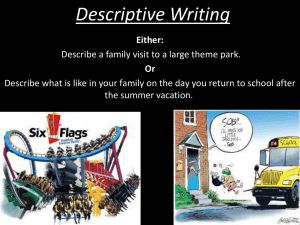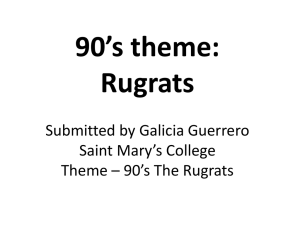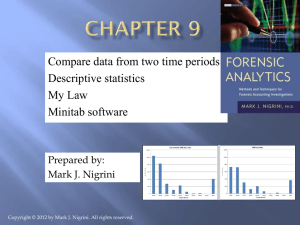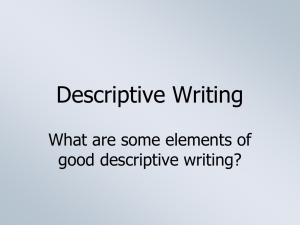Descriptive Writing
advertisement
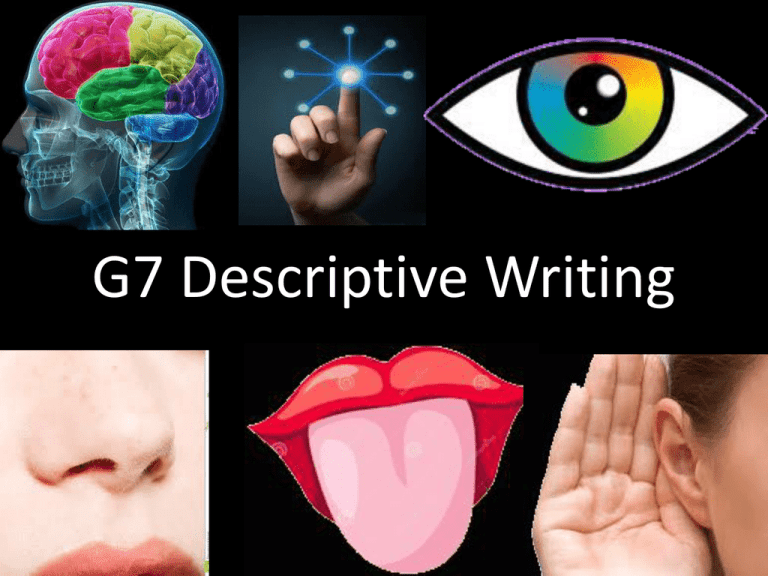
G7 Descriptive Writing Descriptive Writing Learning Objectives To Find out what components are needed to create a piece of descriptive writing. To practice writing pieces of descriptive writing. To learn the skills and techniques needed to successfully answer the Descriptive Writing Question in the Final Exam. Descriptive Writing The primary purpose of descriptive writing is to describe a person, place or thing in such a way that a picture is formed in the reader's mind. Capturing an event through descriptive writing involves using all of your five senses. Try to imagine yourself to be a kind of 4D 'human video camera'! With your searching zoom lens you are going to 'record' what you saw, smelled, touched, tasted and heard in the particular scene or situation the question asks you to describe. A selection of the 'stills' from your video will provide the details for what you describe. Descriptive Writing Think of a theme park you have been to and try to remember what you saw, what you smelled, what you touched, what you tasted and what you heard there. You are going to use these sense memories to build up a piece of descriptive writing that suggests what your day there was like. Descriptive Writing What You see 1. Think of a theme park or funfair you have been to and write a list of some of the things you saw there. 2. Take one or two objects from your list and put it into a sentence that is interesting and exciting. What strengthens description a great deal is to use a few vivid similes and metaphors. Ex: ‘When she got off the my sister looked like a woman just back from a journey to Hell.' Note: To be safe ALWAYS set the time frame in the past using 'saw‘. Descriptive Writing What You Smell 1. Think of a theme park or funfair you have been to and write a list of some of the things you smelt there. 2. Take one or two objects from your list and put it into a sentence that is interesting and exciting. At a theme park there are always food concessions and so if you can’t think of anything else you can always describe what the food smelled like. Ex: ‘My tummy was telling me it was time for lunch when I got off the ride and then my nose detected the heavenly smell coming from the burger van on the corner.’ Note: To be safe ALWAYS set the time frame in the past: 'smelled’ [or ‘smelt’]. Descriptive Writing What You Touch 1. Think of a theme park or funfair you have been to and write a list of some of the things you touched or touched you there. 2. Take one or two objects from your list and put it into a sentence that is interesting and exciting. At a theme park if you are on a ride you can always describe the sensation of the wind on your face. ‘The carriage ended its slow climb up to the top of the ride and as it plunged down the steep slope towards the ground below I felt the wind slap me in the face.’ Note: To be safe ALWAYS set the time frame in the past: ‘touched’ or ‘felt.’ Descriptive Writing What You Taste 1. Think of a theme park or funfair you have been to and write a list of some of the things you tasted there. 2. Take one or two objects from your list and put it into a sentence that is interesting and exciting. At a theme park there are always lots of things to taste, from a burger to a coke or even a piece of cotton candy. Ex: ‘I pulled off a handful of the pink, sticky cotton candy and shoved it into my mouth. It tasted like rough, sweet sandpaper.’ Note: To be safe ALWAYS set the time frame in the past: ‘tasted’. Descriptive Writing What You Hear 1. Think of a theme park or funfair you have been to and write a list of some of the things you heard there. 2. Take one or two objects from your list and put it into a sentence that is interesting and exciting. At a theme park there is always a lot of noise, from the sound of the machinery to the screams of the people on the rides. ‘The carriage ended its slow climb up to the top of the ride and as it plunged down the steep slope towards the ground below I heard the screams coming from my sisters in the carriage behind me.’ Note: To be safe ALWAYS set the time frame in the past: ‘heard’. Descriptive Writing Thoughts & Feelings You should also try to describe the emotions associated with the event you are describing. Describe what you think and feel as well as describing the emotions shown by those around you. So if you are at a theme park you might describe how scared you were going on a very large ride, or to describe how bored you were waiting in line to get onto a ride. ‘The carriage ended its slow climb up to the top of the ride and as it plunged down the steep slope towards the ground below I though that I was going to die.’ Descriptive Writing The Thoughts & Feelings of Others You would normally go to a them park with other people, friends or family and they will go on rides with you. How do they react? 1. Think of a theme park or funfair you have been to and write a list of some of the emotions you saw other people experience there. 2. Take one or two objects from your list and put it into a sen1tence that is interesting and exciting. At a theme park fear and excitement will probably be the principal emotions you see other people show. ‘I could tell by the screams coming from my sisters in the carriage behind me that they were absolutely terrified by this huge ride.’ Note: To be safe ALWAYS set the time frame in the past: ‘afraid’ or ‘terrified.’ Descriptive Writing – The Exam Question You will be given a choice of two topics for descriptive writing in the exam and will need to select one of them as a starting point for your writing. Three of your senses will be identified in the exam question and you will be asked to describe what those three sense experience. Remember: This is a piece of descriptive writing so it is more important that you describe people and places rather than narrate the events you describe. You should try to reference each of the three identified senses at least once in your writing. [10 Marks] You should also try to describe the emotions associated with this event. Describe what you think and feel as well as describing the emotions shown by those around you. [10 Marks] There are 20 Marks for the quality of your writing and 5 Marks for Spelling, Punctuation and Grammar. Practice Question: Describe a family visit to a large theme park.
